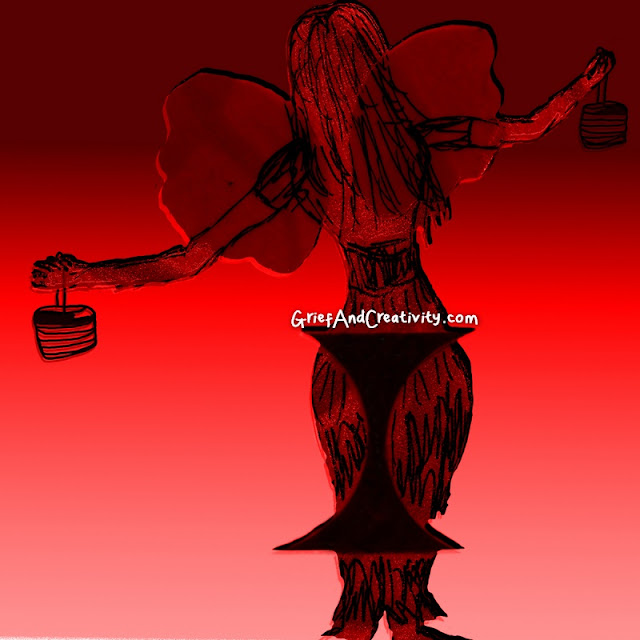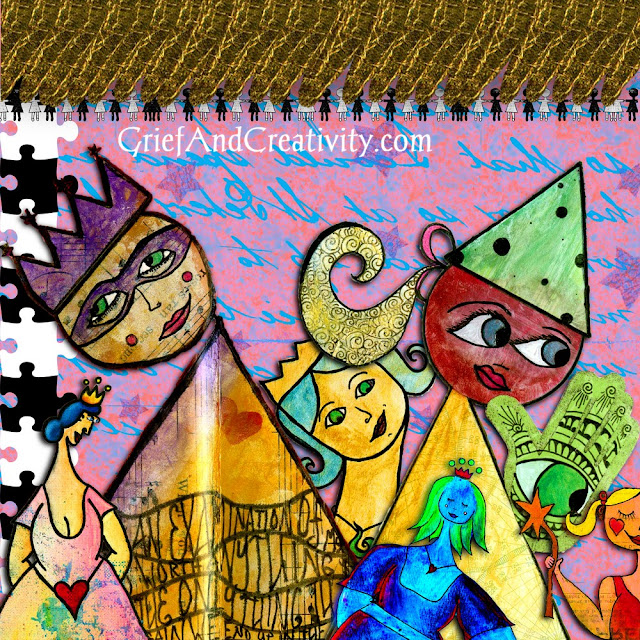Forget Abby...
Bereavement may feel like an extraordinary process, but it is such an ordinary and every single day happening. We’re all human. We all die. Every day people die. Naturally or not. And people are left grieving those who died. Every day. People are left not only trying to integrate this new reality without the person they loved, but also facing mortality issues, seeing up close and personal how death comes for us all, facing issues of their own mortality. This is happening every. single. day. on our planet.
And yet people having grief experiences, more likely than not, are treated as if they suddenly have a disease that needs to be cured, fixed, gotten over or that requires “closure.*” Given that the bulk of our world is a grief denying society**, it actually may be the case that people end up feeling dis-eased (not diseased, but dis-eased). Many people I've worked with over the years are in fact not at ease at all and not being helped to feel at ease either! The more uneasy we feel, the more isolated we may tend to become. The more isolated we become, the more complicated the grief experience becomes. The more complicated the experience, the more ill at ease we get. Vicious cycle.
I'm not sure how we think people can do self-care (individualistic values), when as a community (the context within which we all live, like it or not) we can’t even figure out how to deal with the most ordinary of happenings!? When we can’t face the ultimate reality for all of us? When we have no community value on care in this area?! Death will happen to all of us. It is a fact. And avoiding that fact isn’t helping anyone. So why do we continue this pattern? And how can we change it?
Why it continues
There is an idea you may hear around the issues of addiction or domestic violence that says to truly heal, to be whole again, we must
break the cycle. Until we can break the cycle of our grief denying culture (societal value), we simply repeat the pattern of ostracizing each other and ourselves (individual level) because we play into the denying, we fear challenging the dominant paradigm, the prevailing beliefs of the world around us.
Thus, though it seems so incredibly unfair, those having the grief experiences themselves,
at the very moment they should be getting the most care, instead must muster up and advocate for change. Those having grief experiences themselves must break the pattern. No, it isn’t fair. No, it isn’t easy. But I have come to figure it this way: Hell, I'm ill at ease already anyway, so why not just go with it, lean into the dis-ease, and push for breaking the habits of our cultural denial!? Onward!!
How can we change it
One of the most important things we can do is to give voice to our grief. Refuse to be silent. Speak up, speak often, continue to speak about your grief experience over time. This might be verbal, but it also could be written or communicated through art of various mediums. Just giving expression in whatever ways possible,
*that* is key.
One of the most important models we can provide is to visibly show the evolution of our story. When we first speak up about our grief, we may find our story to be very fact-oriented. We share the minute details like time and date of death, where it happened, how we found out, and other very factual information. But over time, our stories evolve to be less about facts and more about meaning making. We begin to talk about what the death of this person means to us, how our life has been impacted by death, what this death has meant to us in facing our own mortality.
This evolution of the story is crucial as it indicates that there isn't simple closure beyond the facts, but rather an on-going life -- YOUR life -- being LIVED as you express love and what is important to you. As we model this evolution for the people around us, I like to think they are then also given permission to share their stories, to experience evolution for themselves. We all begin to grow and change together in a network of common experiences instead of being isolated in fear and violence. We move to a place where self-care is community care AND community care IS self-care.
By giving expression to our stories, we are also able to more visibly see how ordinarily often death affects us human beings. As we come to terms with one death, we may encounter another death. Our experience must now evolve to incorporate multiple loss. This isn’t a sickness. This is a normal, ordinary part of being human. It is a skill that should be taught, but it doesn’t fit well into scholastic educational curriculums, so we end up learning it on death’s timetable or at the insistence of loss, encountering the lessons whenever grief happens.
It can be a radical thing to refuse to play the grief denying cultural game whenever it crops up. It's been a few years now, but there was a letter sent in and answered by good, old Dear Abby in which the writers asked Abby for advice about how to handle communications with a stillbirth mom in their office place. I was shocked at the time by what seemed and uninformed and uneducated answer given by Abby, and we did a
full article about it in the Loss Journal at KotaPress back then.
Today, I’d like to address just a couple of the points that came up from this national exchange in Dear Abby’s playground. One of the things the co-workers had a problem with was the fact that the stillbirth mom had a photo of her child on her desk. Another thing they had a problem with was communicating with the mom because they said she was “mean and gossipy." Of course Abby told them they were right, that the photos were “inappropriate,” and that the boss should deal with this “delicate” situation.
Have you ever read a more grief denying exchange?! So here is a woman in extreme grief, hurting, feeling alone, trying to integrate all that has happened in her life. And she is calling out to communicate, to express her story, have it be visible. It's just *possible* that if she were given space for that expression, maybe over time, she and her co-workers would have benefitted from both self- and community-care.
But instead, the woman’s photo of her child is abhorred and stigmatized as "making people uncomfortable” because they have to face the reality of death and dying when they’d rather participate in denial, keep their heads down, and work work work. Capitalist productivity over humanity. A-huh.
And, you know, if you were ignored and abhorred – if your children were abhorred like this – do you think you would be mean, angry, difficult to work with, have vindictive feelings towards all around you? I know I sure would – and it would take me a long time to do the self-tending work necessary to work through all the layers of that grief denying crap that was laid upon me!
Abby and the co-workers missed a chance to participate in the solution and instead continued the cycle of abuse and isolation. There are several things that would hold a much more productive truth for all involved, if only Abby or the co-workers would have taken the time to educate themselves – or if the mom (albeit already burdened with her process) had had a model by which advocacy and expression would take precedent over isolation and "closure."
First, office policy would dictate the display of photos, period. If the other co-workers are allowed to have photos of their children displayed, then guess what? The bereaved mom would be allowed to have her photos, too. If she is singled out and prevented from showing her photos, it is at best censorship, and at worst it is discrimination.
If the other workers have a problem seeing the photo – and if the mom is having trouble adjusting being back at work – well those are indeed the boss’ problems. But it is not the boss’ job to simply address this “delicate” issue by shutting it all down. Instead, this boss plays a role in acknowledging this is a real, every day, human, ordinary issue, and everyone on his/her staff needs extra support and education in the areas of death, dying, and bereavement. They all need sensitivity training. A review of their bereavement leave and insurance coverage for mental health support for grief experiences needs to be done. And it sure sounds like they all need to build teamwork skills.
Sadly, in our grief denying culture, Abby doesn’t suggest any of this, the boss probably won’t do anything but censor the photo, maybe fire the mother, and the mother may be on her own to find support for figuring out how to translate grief, isolation, maybe anger into advocacy.
Conclusion
It is my hope that this article can be a prompt that opens discussion, an opportunity to shift our perspectives, a call to action for all of us to learn and begin advocating for change. I wish it could start with multi-media, pop culture, icons like Dear Abby and with bosses in every workplace across the world. But unfortunately, I don’t think that’s going to happen. They will not be “saviors” or even leaders in this realm. And so, though I know grief experiences are the very moments we all need the most help ever, I call on us all, after getting whatever support we need first, to also seek education and active mentors who can then help you step into the role of advocate. We need you. None of us in this world will get out alive, so really, we need you.
Miracles to you,
Kara
* If you are interested in more on why I put the word "closure" in parenthesis, you
might check out Nancy Berns book "Closure: the rush to end grief and what it
actually costs us."
** “Grief Denying Society” was a phrase I first heard in a presentation by
Molly Greist, Stone Sculptor, Bainbridge Island, WA.
[Original version published in KOTA: Knowing Ourselves Thru Art, August 22, 2007]







